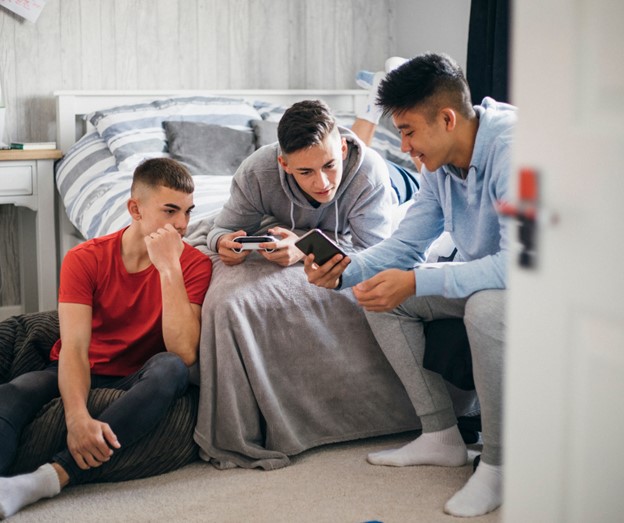In an era where social media reigns supreme, its impact on teenagers is both profound and complex. While it offers unparalleled opportunities for connectivity and self-expression, the darker aspects of this digital dominion cannot be overlooked. This exploration delves into the multifaceted effects of social media on teens, emphasizing the often-overlooked consequences on their mental and emotional well-being.
From the rise in anxiety and depression to the challenges of cyberbullying, each aspect sheds light on the hidden cost of social media. We examine how these virtual interactions can distort self-image, disrupt sleep, and even affect academic performance. As we navigate through the labyrinth of social media’s influence, we uncover its role in creating a sense of isolation amidst a seemingly connected world and the addictive tendencies it fosters. Our journey aims not only to highlight these critical issues but also to offer insights and strategies for addressing the negative impacts of social media on today’s youth.
Social Media and Teens
In the intricate digital landscape that young adults and teens navigate daily, the role of a social media platform cannot be understated. As integral as these platforms have become in fostering connections, they also pose significant challenges to teen mental health. Prolonged social media usage, especially by young people who spend more than three hours per day on these platforms, has been linked to a range of negative effects.
Studies highlight that this extensive digital media use is correlated with heightened risks to user health, including increased symptoms of anxiety and depression. The interactions and behaviors conducted online, often revolving around social comparison and feedback-seeking, contribute to these detrimental outcomes. It is crucial to acknowledge and address these issues, as they profoundly impact the mental well-being of our youth in an increasingly digitalized world.
The Dark Side of Social Connectivity
The dark side of social connectivity unveils a troubling aspect of social media use, particularly among teen girls. As they spend increasing amounts of time on various platforms, the correlation between social media use and poor mental health becomes starkly evident. Studies have shown that prolonged engagement with these digital environments can lead to a spectrum of mental health problems, including heightened anxiety, depression, and, notably, low self-esteem.
This is often exacerbated by harmful content that teens encounter, which tech companies are constantly grappling to manage. The impact is significant; as teen girls and boys navigate through an online world where the pressure to post content that aligns with perceived norms is high, their self-image and well-being can suffer. It’s crucial, therefore, to teach children about the responsible use of social media and the importance of valuing real-life interactions over digital validation. This education is key to mitigating the negative effects of social media and ensuring healthier, more balanced digital media use.
Mental Health Decline: The Hidden Cost of Social Media
The hidden cost of social media reveals a troubling aspect of the digital age. Social media platforms, while offering unprecedented connectivity, have inadvertently become a catalyst for mental health issues among teens. The pervasive influence of these platforms is particularly concerning in terms of body image and self-esteem.
The Rise in Anxiety and Depression
The surge in social media use has paralleled a worrying increase in anxiety and depression among adolescents. The relentless exposure to curated lives and achievements has left many young people feeling inadequate, contributing to decreased self-esteem and even self-harm. This rise is a clear indicator of the need for developing age-appropriate health strategies that include fostering healthy behaviors and promoting physical activity as a counterbalance to digital consumption.
Poor Body Image and Eating Disorders
Social media’s portrayal of idealized bodies has deeply impacted adolescent health, particularly in the realms of body image and eating disorders. The constant comparison with unrealistic standards can lead to abnormal child psychology, negatively influencing neurological development. It’s imperative that current events in the digital realm, including concerns around data privacy and the content teens are exposed to, are addressed to protect and nurture the mental well-being of this vulnerable population.

Cyberbullying: A Virtual Playground for Harassment
In the digital age, cyberbullying has emerged as a pervasive form of online harassment, significantly impacting youth mental health. This phenomenon has transformed social media platforms into virtual playgrounds for harassment, where the potential risks of depressive and anxiety symptoms in teens are alarmingly high.
The Impact of Online Bullying on Teen Well-being
The repercussions of cyberbullying are profound, often leading to low self-esteem and worsening mental health conditions among adolescents. Clinical psychologists note that teens who are victims of online bullying report higher levels of depressive symptoms, with many feeling worse about themselves. This negative impact is compounded by the amount of time spent on social media platforms like Facebook, where bullying can be relentless and pervasive.
The Role of Anonymity in Cyberbullying
Anonymity on social media facilitates a breeding ground for irresponsible behavior, allowing bullies to hide behind their screens. This lack of transparency makes it challenging for parents and guardians to monitor kids’ social media activity and intervene effectively. To combat this, there is a growing need for educating both parents and teens about responsible social media behavior and the importance of fostering a safe online environment. Promoting transparency and accountability in digital interactions is key to mitigating the harmful effects of cyberbullying and safeguarding the well-being of our youth.
A Catalyst for Sleep Disruption
The increasing use of social media among young people has become a significant catalyst for sleep disruption, raising concerns about teen mental health. Transparent and independent assessments reveal that the blue light emitted from screens and the mental stimulation from social media use can interfere with natural sleep patterns.
This disruption is not just a matter of reduced sleep quantity but also impacts the quality of rest, crucial for the developing brains of teenagers. To counter this, many experts suggest creating tech-free zones, especially in bedrooms, to encourage better sleep hygiene. Parents are advised to prioritize user health by implementing a family media plan that includes specific tech-free times, fostering an environment conducive to restful sleep.
Distraction and Academic Performance
Social media’s role in distracting young people from academic pursuits has become a focal point for educators and parents alike. Numerous studies have shown that excessive social media use can negatively impact concentration and the ability to retain information, leading to lower academic performance.
Parents and educational institutions are striving to create effective and timely systems to mitigate these distractions. This includes establishing tech-free zones in educational settings and encouraging students to engage in focused study periods. Future research is vital to further understand the key findings in this area and develop strategies that can be implemented at both school and home to ensure that social media use among teens is balanced and does not impede their academic success.

The Illusion on Social Media Platforms: Unrealistic Life Standards
For many teens, social media platforms have become a mirror reflecting unrealistic life standards, often distorting their perception of reality. These online identities, carefully curated and often idealized, can lead to a significant gap between what young people see online and their actual life experiences.
This disparity can adversely affect life satisfaction, as teens struggle to align their reality with the seemingly perfect lives displayed on platforms like Instagram. The illusion created by social media fosters a sense of inadequacy and can exacerbate depressive symptoms, especially when teens compare their own lives to these idealized online personas.
Social Isolation in a Connected World
Ironically, despite the promise of greater connectivity, social media often leads to social isolation among teens. In a world where online interactions are commonplace, genuine social support can become scarce. Young people, while seemingly connected, may feel worse in terms of mental health and social satisfaction.
This isolation is a byproduct of the time spent on social media, reducing opportunities for face-to-face interactions and real-world relationship building. Parents and guardians are encouraged to create tech-free zones and facilitate transparent communication about the importance of physical social interactions for maintaining mental health.
Effects of Social Media on Youth Mental Health
The impact of social media use on youth mental health is a growing concern for many, including technology companies, parents, and mental health professionals. The constant exposure to social media can lead to a range of mental health issues in young people, including increased anxiety, depression, and lower self-esteem.
To combat this, it is crucial to establish common sense safety standards that prioritize the mental health of teens. Technology companies are called upon to implement greater safety measures and parents to monitor social media use more closely. By fostering an environment that promotes responsible use of social media, we can help safeguard the mental health of our youth.
The Addiction Factor: Social Media Dependency
A recent survey and other various studies have highlighted a growing concern: the addiction factor of social media dependency among teens. Prolonged Facebook use and engagement on various social media platforms have led to what some clinical psychologists refer to as ‘problematic social media use’. This dependency often blurs the line between healthy usage and addictive behavior, with teens finding it increasingly difficult to disengage.
The popularity of these platforms, despite moderate associations with mental health issues, underscores the need for more comprehensive understanding and strategies to manage this dependency. Social media platforms, while offering connectivity, can also foster a compulsive need to stay online, often at the expense of real-life interactions and activities.
Addressing the Negative Impacts of Social Media on Teens
To effectively address the negative impacts of social media on teens, a multi-faceted approach is necessary. Technology companies, along with parents and educators, play a critical role in this. Creating a family media plan that includes limits on social media use can be a starting point. Additionally, support for increased funding in research to understand the full extent of these impacts is crucial.
Efforts to mitigate online harassment and promote social support online are also essential. This approach should involve transparent communication about the potential risks of excessive social media use and actively encourage healthier, more balanced online habits. By working collaboratively, all stakeholders can help shape a safer, more supportive digital environment for teens.
The Role of Technology Companies in Combating Online Harassment
Technology companies play a pivotal role in addressing online harassment on social media platforms. With the increasing prevalence of cyberbullying, these companies are tasked with developing and implementing strategies to create safer online environments.
This includes enhancing moderation policies, employing advanced AI tools for detecting and preventing harassment, and providing users with more control over their online interactions. By prioritizing user safety, technology companies can significantly reduce the instances of online harassment, contributing to a healthier social media experience for all users.
Guidance from Clinical Psychologists: Navigating Social Media Safely
Clinical psychologists offer invaluable guidance for navigating social media safely, especially for vulnerable groups like adolescents. They emphasize the importance of understanding the impact of online interactions on mental health and provide strategies for maintaining psychological health in the digital world.
This includes setting boundaries for social media use, learning to recognize and respond to online harassment, and cultivating a supportive online network. Psychologists also advise on the importance of real-world connections and activities to balance the digital life, promoting overall mental health and resilience.

Creating a Positive Future: Ethical Considerations and Social Responsibility
The future of social media hinges on ethical considerations and social responsibility, both from technology companies and users. It’s essential to foster a culture of respect and empathy online, where users think critically about the content they share and engage with.
Technology companies, on their part, must commit to ethical practices, prioritizing the well-being of users over profit. This includes transparency in data use, protecting user privacy, and continuous efforts to make social media a tool for positive connection and growth. By working together, we can create a future where social media is a space for positive engagement, learning, and healthy socialization.
Finding Support for Adolescent Mental Health in a Digital Age
It’s important to acknowledge that while the digital age brings challenges, help is available for those struggling with its impact. Adolescent treatment centers, such as Zenith Behavioral Health, play a crucial role in providing the necessary support and guidance. These centers, staffed with clinical psychologists and mental health professionals, offer tailored programs to address the unique challenges teens face in the era of social media.
They provide a safe space for adolescents to understand and work through the complexities of their experiences, be it issues related to online harassment, social media addiction, or other mental health challenges. With the right support and resources, teens can navigate the digital world more safely and healthily, learning to use social media in ways that positively contribute to their growth and over health.

